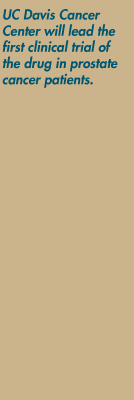Hsing-Jien Kung and his colleagues discovered a signaling pathway needed by advanced prostate cancer cells — will a new drug block that path?
Soon, about 76 volunteers, men with advanced prostate cancer, will have the opportunity to try an investigational drug known as AZD0530. The drug is a targeted agent designed to block a molecule known as src, pronounced "sark." If the drug slows or halts the volunteers' disease, it may become the first effective therapy for hormone-resistant prostate cancer — an advanced form of the illness that doesn't respond to currently available treatments.
Men will have Hsing-Jien Kung and his team to thank.
First to clone src
Together with Don Fujita of the University of Calgary, Kung was the first scientist to clone the human src gene. At UC Davis, Kung and collaborator Chris Evans were the first to show in cell lines and laboratory animals that inhibiting src can thwart hormone resistance in prostate cancer. When the drug maker Astra Zeneca developed AZD0530, the National Cancer Institute selected UC Davis to lead the initial clinical trial of the drug in prostate cancer patients.
Bench to bedside
The drug's development is a model of "bench-to-bedside" research, science focused on making discoveries that lead to new treatments for patients. Since joining UC Davis in 1998 as deputy director of the UC Davis Cancer Center and director of its basic science program, Kung has built the cancer research program into an efficient engine for delivering such cancer treatment advances.
Besides AZD0530, UC Davis investigators have also been instrumental in developing novel drugs for leukemia, lymphoma, breast, brain and ovarian cancers. Several of these agents have reached early clinical trials — the final stages of a long and careful cancer research process in which promising approaches to cancer prevention, diagnosis and treatment are first tested in patients.
"No one drug will be a cure-all. Cancer is too complicated for that," Kung said. "But our hope is to develop an arsenal of targeted therapies doctors can select from, tailored to an individual patient's specific tumor. The goal is to make cancer a treatable, chronic illness — and we're getting closer to that goal every day."
Hormone resistance
Prostate cancer cells start out dependent for their survival on male hormones, or androgens. Even in advanced cases where surgery and radiation are no longer an option, hormonal therapy that suppresses a patient's androgen production can control the disease, often for many years.
But given enough time, the malignant cells learn to live without androgen — and patients and their doctors run out of treatment options.
"Androgen-independence is the problem in prostate cancer," said Kung, a professor of biological chemistry. "That's where the mortality and the trouble begin."
In the jargon of biochemists, prostate cancers find new molecular "pathways" for survival when they are deprived of androgen. Kung has spent the past decade identifying and mapping the pathways used by tyrosine kinases, a family of some 90 proteins that serve as a cell's accelerators. In cancer, one or more accelerators gets stuck in the "on" position.
Kung has been aided in his search by a rapid display method his lab developed, a tool that allows scientists to quickly identify all of the tyrosine kinases in a particular tumor. With it, Kung and his team were able to identify key tyrosine kinases involved in prostate cancer, and to isolate several new ones — among them src's partner, etk, which is also favored by androgen-independent prostate cancer cells.
The src-inhibitor AZD0530 stems from that work.
Inspired research
Kung's inspired, elegant research has earned him a reputation as one of the most brilliant scientists at work on cancer. From his post-doctorate years in the lab of J. Michel Bishop and Harold E. Varmus, who shared the 1989 Nobel Prize in Medicine for their discovery of oncogenes, Kung has progressively zeroed in on prostate cancer.
Kung's lab today, on the second floor of Research III, down the road from the UC Davis Cancer Center, hums with the work of his own post-doctoral researchers. In addition, Kung coordinates the cancer investigations of scientists on three campuses — the UC Davis main campus in Davis, the UC Davis Medical Center campus in Sacramento and the Lawrence Livermore National Laboratory in Livermore.
$64 million budget
On his watch, the cancer center's research budget has exceeded $64.4 million, the research program has grown to 180 scientists and the Cancer Center has become the nation's 61st National Cancer Institute-designated cancer center.
"Hsing-Jien Kung's work has elevated prostate cancer to a level of elegance that didn't exist before he became involved in it," said Ralph deVere White, professor of urology, director of the UC Davis Cancer Center and assistant dean for cancer programs. "But he is more than any one thing. His brilliance is his depth and breadth and the quality of his scientific interactions."
Cautious optimism
The AZD0530 clinical trial will begin after the NCI has completed its review of the study design. The trial will be led by Evans, who chairs the Department of Urology, and Primo N. Lara, Jr., an associate professor of hematology and oncology.
Kung cautions against excessive optimism. He says it's unlikely that blocking a single tyrosine kinase will be sufficient to control prostate cancer. More likely, doctors will need an arsenal of kinase inhibitors that can be used in combination or in succession. Kung and Kit Lam, professor and chief of hematology and oncology, are at work now on an inhibitor for etk.
But Kung envisions a day in the not-too-distant future when tiny fluorescence-tagged kinase markers, injected into a patient, will light up on imaging studies and reveal a tumor's specific kinase activation profile. If a certain kinase has elevated activity, a specific inhibitor will be given. There would be no biopsy, no surgery, no radiation and, because the drug is so highly targeted, very few side effects.
Just imagine.


